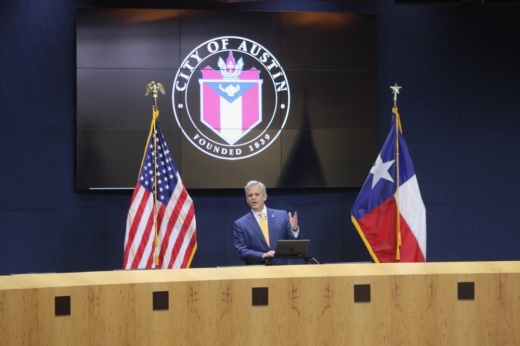In addition to covering several points from the past year since his last address to the city, Adler also focused his remarks on the full scope of his time as mayor.
Adler took over the mayor’s seat after City Council shifted to its current 10-1 geographic district format and later won re-election in 2018. In his Aug. 25 speech, he highlighted that governmental change as one that ushered in the “promise and potential of unprecedented levels of justice and equity” in the city.
And while calling attention to many of the issues the city is still taking action on, including addressing homelessness and public safety, Adler centered his speech around his views of positive changes overseen by him and his council colleagues.
“It is true that much remains to realize the work we have begun over the past eight years. But for tonight, we pause and celebrate where we are and what we’ve achieved, how we got here, and where we need to go,” he said.
Among the issues Adler said were faced by the first 10-1 council were a low local minimum wage, calls for police reform and the Austin Police Department’s rape kit backlog, homelessness, lacking mobility options and affordable housing. On those topics and other local trends tied to the economy and climate, Adler labeled the state of Austin overall as “exceptionally strong" when compared to similar cities.
“It’s easier, less disruptive, to try for only incremental change, sometimes to settle for half-measures, or even to kick a problem down the road entirely. Every city in America has examples of this, of hard choices deferred and deferred again until the hard choices become impossible ones,” he said. “I am so proud and grateful that on one difficult problem after another, the buck has stopped with us. The 10-1 council has stood resolute and taken action, supported by the community, including on some of the most difficult challenges our city faces: mobility, social equity and justice, housing and homelessness.”
City Council was responsible for reallocating tens of millions of dollars out of APD following the summer of 2020—before returning that money in the city's next budget to comply with a new state law targeting such decisions. Officials have also pursued improvements to APD's sexual assault response and handling of rape kits, including an $875,000 settlement made to survivors this year.
On transportation, Adler and other officials backed a 2020 ballot measure to fund the Project Connect light rail and bus system that remains in the works, although its multiyear rollout may face some adjustments tied to a rising price tag. Adler has repeatedly referenced Austin as being in the midst of its "Golden Age of mobility" given the potential of Project Connect as well as the impending yet controversial I-35 redesign and Austin-Bergstrom International Airport expansion, alongside local street and bicycle network upgrades.
Adler went on to touch on how city leaders have handled controversies such as longstanding calls to rethink Austin’s public safety system, the city’s role in state and federal political issues, public health and response to the COVID-19 pandemic, and often-criticized approaches to managing homelessness.
That point, which the mayor called one piece of the “existential crisis” of housing affordability, also remains a top issue locally. Adler painted “disruptive” policy choices such as council's 2019 decision to decriminalize camping in public—an issue he said the city could have handled better—as part of the path leading to the city’s current approach to the issue.
"The decision not to put people in jail, or to hide them in the woods, simply for not having a place to live, was going to be fundamentally disruptive,” he said. “Without that disruption, we would never have come together to agree on a common solution. We would never have raised the funds we are raising now to get the job done. We would never have been, as we are today, the first American city of our size that is poised to end homelessness.”
In addition to continuing funding for initiatives such as the Housing-focused Encampment Assistance Link, or HEAL, program focused on priority public encampments, he also pointed to the ongoing $515 million public-private plan to connect all of Austin’s unhoused residents with homes and its remaining multimillion-dollar funding gap.
To close out his comments, Adler also laid out a slate of issues he said he hopes his successor can address. Those included improvements to general development processes and a revamp of the city's land development code—a goal that twice stalled out under the 10-1 council—moving forward on localized development and revitalization plans, and addressing issues of “extremism, distrust and misinformation” he had also called out in last year’s speech.
"If we retreat from the progress we have made or if we don’t confront and own our most serious challenges; if we nibble at problems, rather than facing them head on; if we shy away from the cost and conflict and disruption that attend anything important enough to be worth doing, we imperil the future we seek," he said.
Adler's remarks led off with appreciation for city officials, staff, community members and his family, and he ended the evening with additional thanks to Austin and appreciation for his time in office.
“Being mayor of this magical place, the third longest-serving mayor in the history of this city, has been an honor beyond description. I love this city, and I always will. And while there’s more work that I still need to get done, in January I will leave this office with a glad heart,” Adler said.
Adler's term expires in early January when Austin will welcome a new mayor for the first time in eight years. Alongside that turnover, at least three City Council seats will also be filled by newcomers to the council dais while two incumbents face contested paths to re-election.
Overall, more than 30 candidates have entered the races for mayor and City Council that will be decided in the Nov. 8 election.





